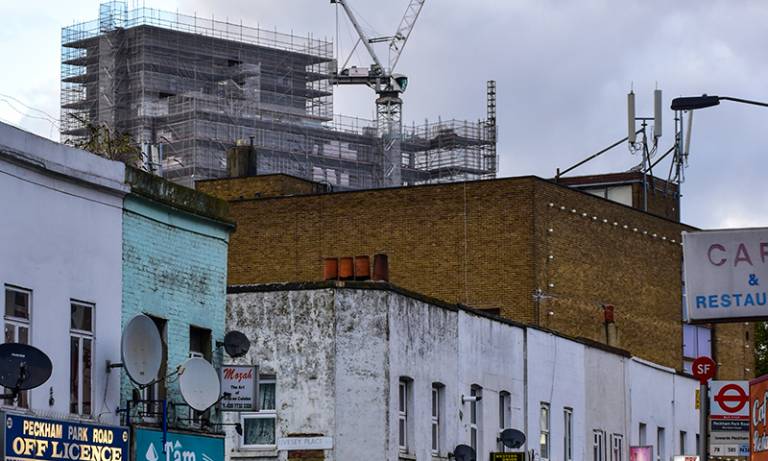Youth Engagement in London Planning (YELP) Report: MSc UDP collaborates with the Just Space network
11 July 2017

For those working for socially and environmentally just cities, the exclusion of young people from formal planning is of profound concern. This exclusion takes multiple forms, and relates as much to the marginalisation of young people from formal planning processes, as to their self-exclusion from procedures that too often seem impenetrable, and which they do not trust. Either way, the result is that young people’s diverse needs and aspirations remain largely unaddressed in the capital. In London, as indeed across the UK, this generalizable trend has been exacerbated by dramatic national funding cuts of youth services and youth organisations over the last few years. These cuts have taken their toll on already tenuous relations between government and this ‘hard to reach’ demographic.
Current planning in London may offer an opportunity to revisit the terms of a meaningful engagement in the making of London’s shared future. Elected on the back of widespread discontent over the London housing crisis, and in celebration of London’s diversity, Mayor Sadiq Khan’s new administration has announced an intention to review its approach to community engagement in advance of preparing a revised London Plan ‘for all Londoners’. Within this process, amplifying the voice of young Londoners has been identified as an area of focus for the new mayoral team.
This is the context for the action-research partnership between the DPU and the Just Space network, carried out as part of the DPU’s MSc Urban Development Planning (UDP) from October to December 2016. Working with community and youth groups across London, MSc students interrogated current processes for youth engagement at different scales, and sought ways in which such processes could be improved, extended and strengthened for London’s 18-25 year olds.
The project was a collaborative endeavor, involving crucial inputs from a variety of actors, including the community network of Just Space; community groups Grove Park Neighbourhood Forum and PemPeople; the activist group of young Londoners Take Back the City; the GLA’s youth focused Peer Outreach Team (POT); UCL staff members; and, of course, the MSc students themselves.
Sponsored through a grant from the UCL Grand Challenges of Sustainable Cities, the ‘Youth Engagement in London Planning’ – or YELP – report encapsulates the key learnings from this multi-actor engagement. These include:
1. Effective youth engagement is directly connected to citizen education
Young Londoners are acutely aware of changes occurring in their neighbourhoods, but currently have limited knowledge or understanding of planning processes and proposals at play. To address this, engagement methods and materials must be relevant to the everyday realities of young people.
2. Effective youth engagement happens on home turf
Young Londoners are best engaged in spaces that are relevant to their day-to-day lives. Retaining and reviving youth-orientated facilities is therefore key to enhancing youth participation.
3. Effective youth engagement encourages contributions in an array of forms
Youth engagement approaches must create flexible, inviting spaces that give equal weight to a wide variety of contributions from different groups of young people.
4. Effective youth engagement is strengthened by short-term outcomes
Young people currently lack trust in formal decision making processes and often feel victimised by regeneration outcomes. To rebuild trust, young people must see their opinions converted into actions in the short-term.
5. Effective youth engagement works with, not around, Community Based Organisations
Young people are best engaged through projects / organisations that already offer them support and which have an established relationship of trust. These organisations require political and financial support to consolidate and extend their capacity for youth engagement.
The YELP report (and summary pamphlet) has been developed with the expressed intention of sharing learnings form the UDP action-research and exploring how these can inform the production of the Mayor’s upcoming statutory strategies.
To date, the report has been presented by Just Space at roundtable discussions with GLA officials on Skills strategy, Economic Fairness and Diversity and Inclusion with further opportunities at the forthcoming roundtables on Social Infrastructure and Health Inequalities. These roundtable discussions represent an addition to the GLA consultation schedule and are an opportunity for community groups to meet with various GLA teams, share useful research and discuss the content and process of the revised Mayoral Strategies.
The YELP report has also been shared at the June London Assembly Planning Committee meeting and will be tabled at the next London Assembly Housing Committee meeting. Additionally, Just Space plan to deliver a copy of the report to each of the GLA strategy teams responsible for housing, environment, economy, transport, culture, health and the London Plan, with a request to consider how they plan to engage young people during the public consultation phases associated with each emerging strategy.
Just Space is hoping that the YELP report and its presentation will encourage the GLA units to think about the needs of young people, as well as how they can reach out to young people in their engagement plans.
Finally, Just Space will share the report at community events where young people’s voice is on the agenda – for example at the ‘Our Way Ahead’ Community Conference being hosted at London Metropolitan University on 12th July.
A pamphlet has also been produced as an accompaniment to the report.
For further information, please contact Barbara Lipietz (b.lipietz@ucl.ac.uk), Caren Levy (c.levy@ucl.ac.uk) or Tim Wickson (t.wickson@ucl.ac.uk)
 Close
Close

